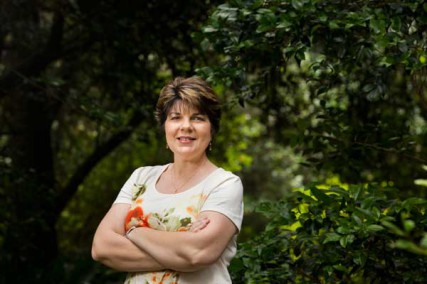
BETHESDA, MD — As coming out parties go, this was a big one.
As the American Atheists convention here wound down in March, a woman with short dark hair and a dark suit took the stage.
Standing under the projection of a large capital “A,” she told the crowd of several hundred that she was a pastor who, for the last several months, had been questioning her beliefs online under the pseudonym “Lynn.”
Then she took a deep breath and said, “My name is Teresa. And I am an atheist.” As the room exploded with cheers, Teresa MacBain wiped away tears.
MacBain, 44, is the latest “graduate” of The Clergy Project, an online support network for pastors who, like her, have lost their faith and found atheism.
The goal of the project is not to pull pastors from the pulpit, but to provide those who have already lost their faith with a safe place to anonymously discuss what comes next. The hope is they will, like MacBain, eventually feel strong enough to put their families, friends and careers on the line and announce their atheism.
“When you leave the ministry, you can lose all of that, “ said Dan Barker, a former minister, co-president of the Freedom From Religion Foundation and a founder of The Clergy Project. “You have to ask yourself, ‘Who am I now?’ . . . . The Clergy Project is a place where their self-respect is restored.”
Barker traces the origin of the project to conversations with struggling pastors and a meeting with Richard Dawkins, the evolutionary biologist and prominent atheist. All felt the need for a place where active clergy could make the transition from Sunday mornings in the pulpit to Sunday mornings in bed.
That need was given new urgency in 2010 when Daniel Dennett, a Tufts University professor and another prominent atheist, and Linda LaScola, a qualitative researcher, published an article outlining their work with five active clergy — all Protestant males — whose faith had crumbled.
These men, they found, had much in common — all went into ministry to help people, all began questioning their seminary training, and all let go of their faith gradually. And all expressed confusion and frustration about how to live and work as atheists.
“They have early doubts that they do not act on,” LaScola said after the convention. “Then they keep quiet. They don’t tell their colleagues. It is a slow process from belief to lack of belief.”
The 2010 study garnered a lot of attention among atheists, and The Clergy Project was launched in March 2011 with the help and support of FFRF and Dawkins’ foundation.
Today, Barker says the project has about 200 online members, including active and former clergy from Protestant, Catholic, evangelical and Pentecostal backgrounds. There are also a couple of rabbis and a lone imam. All choose pseudonyms and share only as much as they feel comfortable with each other.
Mike Aus, 48, pastor of a Houston Lutheran congregation of 150 people, found The Clergy Project last year after years of solitary doubt. The day before MacBain’s appearance at the convention, he announced his atheism on MSNBC’s “Up With Chris Hayes.”
After addressing the convention — which also greeted him enthusiastically — he said he felt like a burden had been lifted upon connecting with The Clergy Project.
“The most important thing to me was knowing I wasn’t alone,” he said. “It was that fundamental sense of community with people who were experiencing the same things I was. It let me know it was not the end of the road, that there was life after this calling.”
MacBain, too, said her doubts started years ago. When she came to the Maryland convention, she was pastor of a 200-member Methodist church in Tallahassee, Fla. She decided to go public, she said, because she could not go on.
“When I stepped up there, I knew I was finished,” she said later. “I could only live so long doing a double life. I think any person who has any integrity, it eats away at your soul — or lack of soul.”
The cost was high — something MacBain realized fully only after returning home. Some friends cut her off, and some family members said she is unwelcome in their homes. She received hate mail and became afraid to leave the house alone.
But emotions run high in both directions. MacBain’s congregation apparently felt so blindsided that they locked her out of the church, she said. Her husband, a police officer, had to go in and pick up her things, which were already packed, she said.
Aus’ congregation, unaware of his change of heart until learning about it on television — on Palm Sunday, no less — decided to disband. Their final service was Easter Sunday.
“There was anger, yes,” said Joe Vingle, a member of Aus’ Texas church. “Some people had been with Mike for 20 years or longer. Those were the ones that were really hurt. They are feeling that everything they were taught by him is a lie.”
But Vingle said there was also understanding. “He is still a friend and I am interested in seeing where this takes him,” he said.
In a way, the convention was also a coming out for The Clergy Project. A day later, project leaders met to explore new services they might provide for pastors — short-term loans, employment assistance and scholarships.
And they appointed a new executive director — MacBain.
“As these clergy come out they are not just thrown to the wolves,” she said. “They can find resources that will help them take the next step.”





